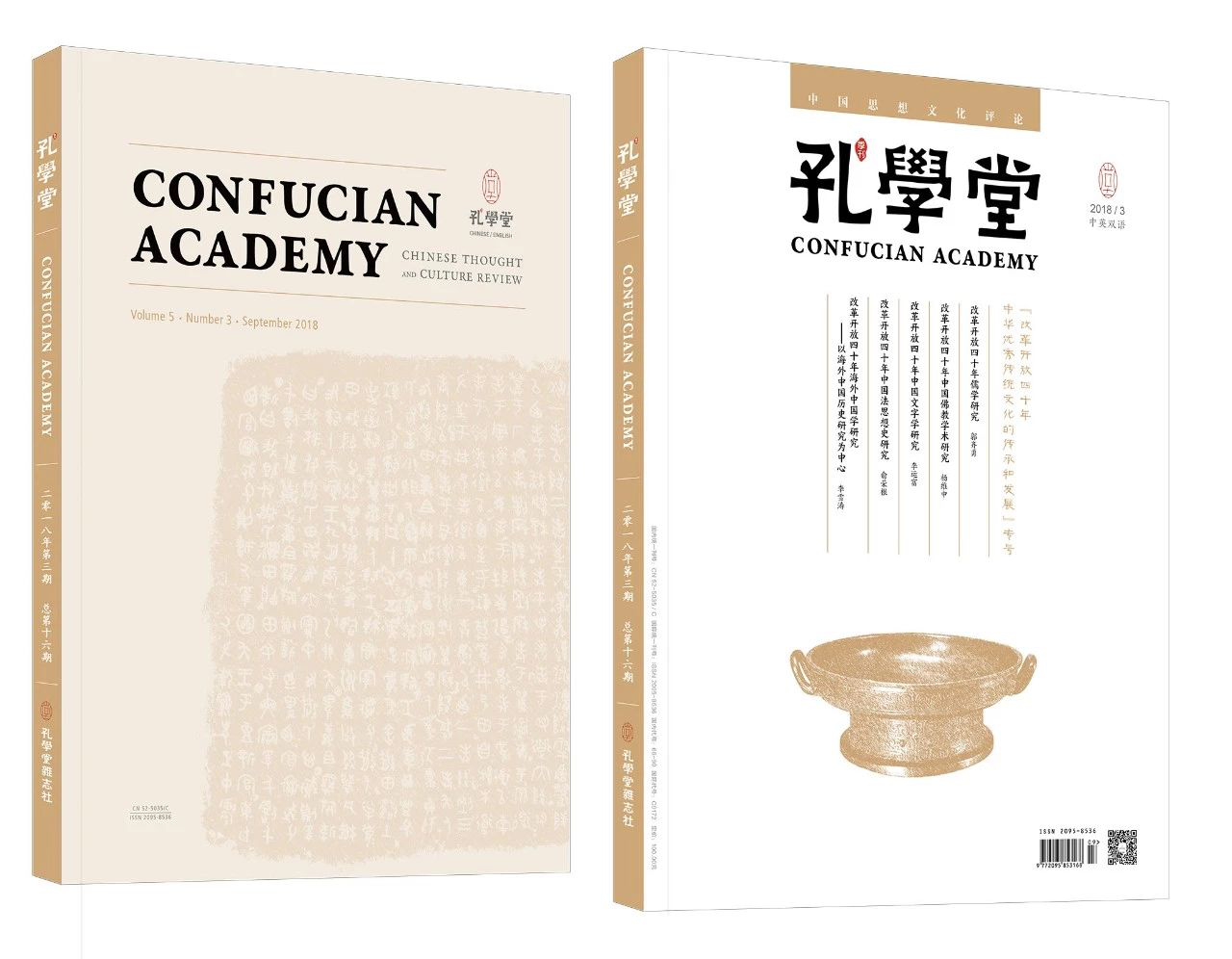


CONFUCIAN ACADEMY
Chinese Thought
and Culture Review
VOLUME 5 ·Number 3 ·September 2018
Special Issue on Traditional Chinese Culture Studies for the Fortieth Anniversary of Reform and Opening-Up
Introduction to the Special Theme
Guo Qiyong
Contributors to this Issue
Hou Xudong and Shi Guanghui
CONTENTS
Guo Qiyong and Liao Xiaowei
Yang Weizhong
Zhan Shichuang and Chu Guofeng
Liu Yuedi and Li Xiujian
Li Yunfu, Wen Min, and Wei Liangyu
Chen Wenxin and Pan Zhigang
Yu Ronggen and Qin Tao
Yang Ying
Li Xuetao
Introduction to the Special Theme
Guo Qiyong Professor from the School of Philosophy and the School of Chinese Classics at Wuhan University
To carry out the proposal of cultural confidence made at the 19th National Conference of the Communist Party of China and in the series of key speeches by General Secretary Xi Jinping on the “promotion of excellent Chinese culture,” Confucian Academy is publishing a special issue dedicated to the forty years of reform and opening-up and the inheritance and development of excellent Chinese culture. More than ten professors and researchers nationwide have been invited to write articles reflecting on the development of different sub-disciplines of humanities in the past forty years. They assess the achievements we have made and summarize our experiences, successes, and failures by reviewing the process at different stages.
The present special issue contains studies spanning the forty years that involve Confucianism, Buddhism, Daoism, customary culture history, ancient literature history, philology, traditional Chinese aesthetics, history of Chinese legal thoughts, and overseas Chinese studies. These studies examine the contribution of concepts, humanistic spirit, and moral standards in Chinese culture to the rejuvenation of the Chinese nation. Many areas will not be covered in this issue due to the limited space as well as the broadness and profundity of Chinese culture.
The principles of “emancipation of the mind” and “seeking truth from the facts” applied to the inheritance and development of traditional culture help us gain insights into the selective handling of total Westernization and national essentialism. We are also expected to have a comprehensive understanding of the relationship between the world’s cultures and Chinese culture, to carry forward Chinese culture in a healthy way, and to promote its creative transformation and innovative development based on cultural consciousness and confidence in the spirit of the times.
The past few decades have witnessed rich perspectives and content in the studies and development of traditional Chinese culture. The articles in this special issue go beyond a simple listing of literature or one-fold review and instead incorporate authors’ comments into objective descriptions. We aim to combine academic mind and intellectual scholarship. The authors make efforts to observe academic norms by using precise language, logic, rich material, and evidence. However, due to the complexity of the subject matter, the studies contained in this issue may fall short from being comprehensive and may lead to overgeneralizations that incite readers’ criticism.
It is our sincere hope that all cadres, scholars, and common people, including the youth, learn about Chinese culture in more depth while developing their cultural identity and awareness. This is the foundation of the Chinese cultural development from which we will achieve ethical consensus and ultimate faith and from which we will integrate the essence of Western and modern cultures into our Chinese culture. Community academies have recently prospered in the wake of the recovery of rural Confucianism and folk Confucianism. These new phenomena are worthy of our attention and further study. In the present era of cultural exchange and dialogue, we should maintain the subjectivity and ontology of our own culture, without which we cannot start a dialogue with other cultures. Against the backdrop of Heaven and the Way of Heaven, benevolence-centered values such as filial piety and fraternal duty, loyalty, faithfulness, integrity, righteousness, propriety, and wisdom still remain our core values, although some aspects may be in need of adaptation to the times. All of these values form the main contribution of Chinese culture to the world.